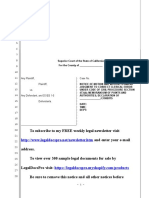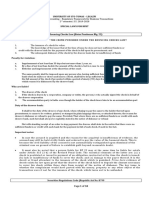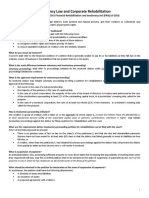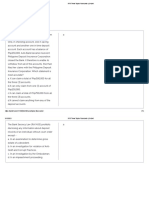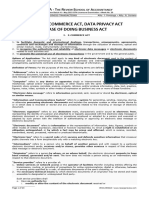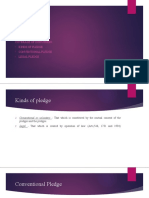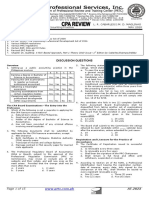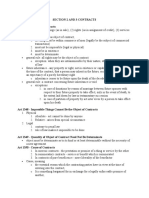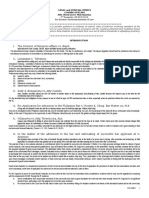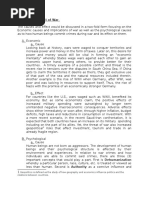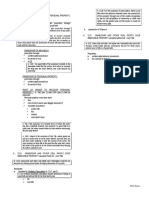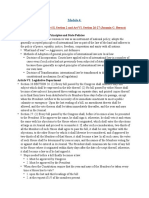100%(2)100% found this document useful (2 votes)
386 viewsBP 22 Nego Notes
BP 22 Nego Notes
Uploaded by
Anna LesavaFor a person to be presumed guilty under the law penalizing worthless checks, three requirements must be met: 1) the check must be presented for payment within 90 days, 2) the drawer must be notified that the check was not paid, and 3) the drawer fails to pay the amount or arrange payment within 5 days of notice. The document then outlines the elements of the crime and penalties under the law. It also discusses cases related to challenges of the law and its application.
Copyright:
© All Rights Reserved
Available Formats
Download as DOCX, PDF, TXT or read online from Scribd
BP 22 Nego Notes
BP 22 Nego Notes
Uploaded by
Anna Lesava100%(2)100% found this document useful (2 votes)
386 views5 pagesFor a person to be presumed guilty under the law penalizing worthless checks, three requirements must be met: 1) the check must be presented for payment within 90 days, 2) the drawer must be notified that the check was not paid, and 3) the drawer fails to pay the amount or arrange payment within 5 days of notice. The document then outlines the elements of the crime and penalties under the law. It also discusses cases related to challenges of the law and its application.
Original Description:
Negotiable Instruments of De Leon
Copyright
© © All Rights Reserved
Available Formats
DOCX, PDF, TXT or read online from Scribd
Share this document
Did you find this document useful?
Is this content inappropriate?
For a person to be presumed guilty under the law penalizing worthless checks, three requirements must be met: 1) the check must be presented for payment within 90 days, 2) the drawer must be notified that the check was not paid, and 3) the drawer fails to pay the amount or arrange payment within 5 days of notice. The document then outlines the elements of the crime and penalties under the law. It also discusses cases related to challenges of the law and its application.
Copyright:
© All Rights Reserved
Available Formats
Download as DOCX, PDF, TXT or read online from Scribd
Download as docx, pdf, or txt
100%(2)100% found this document useful (2 votes)
386 views5 pagesBP 22 Nego Notes
BP 22 Nego Notes
Uploaded by
Anna LesavaFor a person to be presumed guilty under the law penalizing worthless checks, three requirements must be met: 1) the check must be presented for payment within 90 days, 2) the drawer must be notified that the check was not paid, and 3) the drawer fails to pay the amount or arrange payment within 5 days of notice. The document then outlines the elements of the crime and penalties under the law. It also discusses cases related to challenges of the law and its application.
Copyright:
© All Rights Reserved
Available Formats
Download as DOCX, PDF, TXT or read online from Scribd
Download as docx, pdf, or txt
You are on page 1of 5
For presumption to apply, the ff.
requisites must be met:
1. check is presented w/in 90 days from date of the check
2. drawer or maker of the check receives notice that such check has
not been paid by the drawee; and
3. drawer or maker of the check fails to pay the holder of the check
amount due thereon, or to make arrangements for its payment in 5
working days after receiving written notice that such check has not
been paid by the drawee.
*notice of non-
payment must be
given for
presumption to
apply since lack of
which prevents the
determination of the
crucial 5-day period.
BP 22: 11
th
week
BP 22: An Act Penalizing the Making or Drawing and Issuance of a check without sufficient funds or
credit and for other purposes.
Section. 1 Checks without sufficient funds
Acts Penalized:
Making, drawing or issuing of any check that would apply on account or for value, knowing
that at the time of issue, he does not have sufficient funds in or credit with the drawee bank
for the payment of such check in full upon presentment
o That check is subsequently dishonored by the drawee bank for insufficiency of
funds or credit or
o Would have been dishonored for the same reason had not the drawer, without any valid
reason, ordered the bank a stop payment
(having sufficient funds to cover full amount of check at the time of the making, drawing or
issuance of check) but failed to keep sufficient funds or to maintain a credit to cover full
amount of check at time of presentment within a period of 90 days from date of appearing
thereon, for which reason it is dishonored by drawee bank.
Punishment: (at the discretion of the court)
Imprisonment for not less than 30 days but not more than 1 yr or
By a fine of not less than but not more than double the amount of the check which fine shall not
exceed 200K or
Both fine and imprisonment
Section. 2 Evidence of knowledge of insufficient funds
Dishonor of drawee bank is to be a prima facie evidence of knowledge of such insufficiency of
funds or credit
Unless
o maker or drawer pays the holder thereof the amount due thereon, or makes
arrangements for payment in full by the drawee of such check within 5 banking days
after receiving notice that such check has not been paid by the drawee.
Section. 3 Duty of drawee; rules of evidence
When refusing to pay the holder upon presentment, it should have the refusal be written,
printed, or stamped in plain language thereon or attached thereto, the reason for drawees
dishonor or refusal to pay the same.
Provided:
o Where there are no sufficient funds in or credit with such drawee bank, such fact shall
always be stated in the notice of dishonor or refusal.
In all prosecutions under this Act, the introduction in evidence of any unpaid and dishonored
check, having the drawee's refusal to pay stamped or written thereon or attached thereto, with
the reason therefor as aforesaid, shall be prima facie evidence of the making or issuance of
said check, and the due presentment to the drawee for payment and the dishonor thereof, and
that the same was properly dishonored for the reason written, stamped or attached by the
drawee on such dishonored check.
Notwithstanding receipt of an order to stop payment, the drawee shall state in the notice that
there were no sufficient funds in or credit with such bank for the payment in full of such check,
if such be the fact.
Section 4. Credit construed. - The word "credit" as used herein shall be construed to mean an
arrangement or understanding with the bank for the payment of such check.
Section 5. Liability under the Revised Penal Code. - Prosecution under this Act shall be without
prejudice to any liability for violation of any provision of the Revised Penal Code.
Section 6. Separability clause. - If any separable provision of this Act be declared unconstitutional, the
remaining provisions shall continue to be in force.
Section 7. Effectivity. - This Act shall take effect fifteen days after publication in the Official Gazette.
Approved: April 3, 1979.
Took effect: June 29, 1979 (15 days after its publication on June 14, 1979)
Notes:
Where check is drawn by a corporation, company or entity person or persons who actually
signed the check in behalf of such drawer is/are liable under BP 22.
Deceit is not an essential element of the offense
Malice or criminal intent is immaterial.
Every element of the crime is still to be proven before TC to warrant a conviction for violation
thereof.
Elements:
a. The making, drawing and issuance of any check to apply on account or for value;
b. The knowledge of the maker, drawer, or issuer that at the time of issue he does not have
sufficient funds in, or credit with the drawee-bank for the payment of such check in full upon its
presentment; and
c. Subsequent dishonor of the check by the drawee-bank for insufficiency of funds or credit, or
dishonor for the same reason had not the drawer, without any valid cause, ordered the bank to
stop payment.
Checks covered: covers all kinds of checks drawned against banks and issued in the Philippines.
Mere act of issuing a worthless check whether as a deposit, as a guarantee, or an accommodation,
or even as an evidence of a pre-existing debt, is a malum prohibitum.
Includes within its coverage:
o Making and issuing of a check by one who has no account with a bank or
o Where such account was already closed when the check was presented for payment.
Under the law, foreign checks, provided they were drawn and issued in the Philippines though
payable outside thereof, are within the coverage of the law.
Aim of the act: to put a stop to or curb the practice of issuing checks that are worthless.
o What the law punishes is the making of worthless checks and putting them in circulation.
Presumption cannot hold if there is evidence to the contrary.
Yolanda (Payee) - Engaged
in jewelry business.
Recuerdo (Drawer ) - dentist
Prudential Bank - Drawer
bank
Liberty Savings and Loan
Association - Drawee Bank
11
th
week cases:
1. Lozano v. Martinez
Facts: Petitioners are contesting that BP 22 is consummated only upon the dishonor or non-
payment of the check when it is presented to the drawee bank and that the statute is really a bad
debt than a bad check law. And that what it punishes is the non-payment of the check, not the
act of issuing it.
There are 2 constitutional provisions being raised to have been impaired:
a. Constitutional provision on imprisoning a person for debt
b. Constitutional provision on freedom to contract.
Other concerns against BP22
c. Constitutes as an undue or improper delegation of legislative power, on the theory that the
offense is not completed by the sole act of the maker or drawer but is made to depend on the
will of the payee. (logic of argument stretches to absurdity).
d. Sec. 9(2) of Art. VII of the 1973 Constitution was violated.--> prohibits the introduction of
amendments to a bill during the 3
rd
rdg. theres no merit in this claim.
Issue: WON is BP 22 a valid law?
Held: YES. Enactment of BP 22 is a declaration by the legislature that, as a matter of public
policy, the making and issuance of a worthless check is deemed a public nuisance to be abated
by the imposition of penal sanctions. It is a valid exercise of the police power and is not repugnant
to the constitutional prohibition against imprisonment for debt.
Checks are deemed as convenient substitutes for currency in commercial and financial
transactions. The basis or foundation of such perception is confidence. If such confidence is
shaken, the usefulness of checks as currency substitutes would be greatly diminished or may
become nil. Any practice therefore tending to destroy that confidence should be deterred, for the
proliferation of worthless checks can only create havoc in trade circles and the banking
community.
Checks cannot be categorized as mere contracts. It is a commercial instrument that has become
a convenient substitute for money. It forms part of the banking system and therefore not entirely
free from the regulatory power of the state.
2. Recuerdo v. People
Facts:
Yolanda sold a 3-Karat loose diamond stone valued at P420K to
petitioner.
Petitioner gave downpayment of 40K. In settlement of the balance,
petitioner issued 9 postdated checks: 8 of which in the amount of
P40K; 1 in the amt. of P20K. All drawn against account at Prudential
Bank.
When Yolanda deposited 8 out of 10 checks to her depository bank
(LS), only of the 3 checks were cleared. The 5 were dishonored due
to the closure of petitioners account.
She went to petitioners dental clinic and advised her to change the
dishonored checks to cash. this was disregarded.
A demand letter was sent to petitioner but she failed to heed the
same. led to filing of 5 information.
MeTC convicted petitioner. RTC and CA affirms the decision.
Issue: WON petitioner was validly convicted under BP 22?
Held: YES. The terms and conditions surrounding the issuance of the check is irrelevant.
Yolandas testimony that when she deposited the checks to her depository bank they were
dishonored due to "Account Closed" thus sufficed. In fact, even petitioners counsel during trial
admitted the dishonor, and on that ground.
"A check issued as an evidence of debt, though not intended for encashment, has the
same effect like any other check. It is within the contemplation of B.P. 22, which is explicit
that "any person who makes or draws and issues any check to apply for an account or for
value, knowing at the time of issue that he does not have sufficient funds in or credit with
the drawee bank x x x which check is subsequently dishonored x x x shall be punished by
imprisonment." (Emphasis supplied.)
"BP 22 does not appear to concern itself with what might actually be envisioned by
the parties, its primordial intention being to instead ensure the stability and commercial
value of checks as being virtual substitutes for currency. It is a policy that can be easily
eroded if one has yet to determine the reason for which checks are issued, or the terms and
conditions for their issuance, before an appropriate application of the legislative enactment
can be made."
(Emphasis supplied)
The contention that BP22 is a bill of attainder (one which inflicts punishment w/o trial) fails. Under
BP 22, every element of the crime is still to be proven before the trial court to warrant a conviction
for violation thereof.
3. People v. Nitafan
Facts: Respondent Lim was charged before the court with violation of BP 22. That accused make
or draw and issue a check to Sasaki a Trust Company Check dated Feb. 9, 1985 in amount of
P143K knowing that at the time of issue, he did not have sufficient funds in or credit with the
drawee bank. That such check was dishonored by drawee bank for insufficiency of funds and
despite receipt of notice of such dishonor, accused failed to pay Sasaki amount of said check or
to make arrangement for full payment of the same within 5 banking days after receiving said
notice.
July 1986 Lim moved to quash information on ground that what he issued was a memorandum
check which was in the nature of a promissory note, thus civil in nature.
Issue: WON a memorandum check is within the ambit of BP 22?
Held: YES. A memorandum check, upon presentment, is generally accepted by the bank. Hence
it does not matter whether the check issued is in the nature of a memorandum as evidence of
indebtedness or whether it was issued is partial fulfillment of a pre-existing obligation, for what the
law punishes is the issuance itself of a bouncing check
15
and not the purpose for which it was
issuance. The mere act of issuing a worthless check, whether as a deposit, as a guarantee, or
even as an evidence of a pre-existing debt, is malum prohibitum.
A memorandum check comes within the meaning of Sec. 185 of the Negotiable Instruments Law
which defines a check as "a bill of exchange drawn on a bank payable on demand." A check is
also defined as " [a] written order or request to a bank or persons carrying on the business of
banking, by a party having money in their hands, desiring them to pay, on presentment, to a
person therein named or bearer, or to such person or order, a named sum of money
A memorandum check is in the form of an ordinary check, with the word "memorandum", "memo"
or "mem" written across its face, signifying that the maker or drawer engages to pay the bona fide
holder absolutely, without any condition concerning its presentment. Such a check is an evidence
of debt against the drawer, and although may not be intended to be presented, has the same
effect as an ordinary check, and if passed to the third person, will be valid in his hands like any
other check.
4. People v. Chua
5. People v. Cugayan
6. Cueme v. People
7. Wong v. CA
8. Nagrampa v. People
9. Ting v. CA
10. Danao v. CA
11. Domagasan v. CA
12. Rico v. People
13. Yu Oh v. CA
14. Tadeo v. People
15. Llamado v. CA
16. Vaca v. CA
17. Lim v. People
18. Tan v. Mendez
19. Svendsen v. People
20. Wilkie v. Limos
21. Mitra v. People
22. Heirs of Simon v. Chan
You might also like
- Post Motion To Vacate ConvictionDocument18 pagesPost Motion To Vacate ConvictionSteve Smith100% (2)
- Sample Motion To Amend California Judgment To Correct Clerical ErrorDocument4 pagesSample Motion To Amend California Judgment To Correct Clerical ErrorStan Burman100% (4)
- Progress Report On Frustrated MurderDocument3 pagesProgress Report On Frustrated MurderAnonymous LsPY2h277% (26)
- What Are The Elements of The Crime Punished Under The Bouncing Checks Law?Document18 pagesWhat Are The Elements of The Crime Punished Under The Bouncing Checks Law?Bill Breis100% (1)
- Data Privacy Act ReviewerDocument2 pagesData Privacy Act ReviewerLuigi Marvic FelicianoNo ratings yet
- Loss, Claims Settlement & The ICDocument37 pagesLoss, Claims Settlement & The ICgilberthufana446877100% (2)
- Dieuvu Forvilus, A071 552 965 (BIA Jan. 28, 2014)Document10 pagesDieuvu Forvilus, A071 552 965 (BIA Jan. 28, 2014)Immigrant & Refugee Appellate Center, LLCNo ratings yet
- Bouncing CheckDocument3 pagesBouncing CheckRyan Timothy EspejoNo ratings yet
- Batas Pambansa BLG 22Document19 pagesBatas Pambansa BLG 22JS DSNo ratings yet
- Bouncing Checks LawDocument29 pagesBouncing Checks LawRowena Imperial Ramos67% (3)
- Bank Secrecy LawDocument8 pagesBank Secrecy LawHermie Dela CruzNo ratings yet
- Notes in Anti-Money Laundering Act Atty. DJ: Tarlac State UniversityDocument15 pagesNotes in Anti-Money Laundering Act Atty. DJ: Tarlac State UniversityCatherine SimeonNo ratings yet
- Part 15 - E-Commerce ActDocument19 pagesPart 15 - E-Commerce ActMarianne BautistaNo ratings yet
- PDIC LawDocument27 pagesPDIC LawSuzette VillalinoNo ratings yet
- RFBT Handout Bank Secrecy and Unclaimed Balances - Batch 2019Document3 pagesRFBT Handout Bank Secrecy and Unclaimed Balances - Batch 2019E.D.JNo ratings yet
- Insolvency Law and Corporate RehabilitationDocument33 pagesInsolvency Law and Corporate RehabilitationElizar JoseNo ratings yet
- Republic Act No. 3765 Truth in Lending ActDocument6 pagesRepublic Act No. 3765 Truth in Lending ActMarc Geoffrey Habab100% (2)
- TOPIC 1: PDIC LAW (RA 3591, Amended by RA 7400, 9302 and 9576)Document3 pagesTOPIC 1: PDIC LAW (RA 3591, Amended by RA 7400, 9302 and 9576)Christine JotojotNo ratings yet
- Special Tax Laws Senior CitizensDocument35 pagesSpecial Tax Laws Senior CitizensMariaNo ratings yet
- LAW AMLA PresentationDocument28 pagesLAW AMLA PresentationThilagavathy PalaniappanNo ratings yet
- PDIC Maximum Deposit Insurance CoverageDocument7 pagesPDIC Maximum Deposit Insurance CoverageChiemy Atienza YokogawaNo ratings yet
- Banking Laws PhilippinesDocument4 pagesBanking Laws PhilippinesIra Nathalie LunaNo ratings yet
- Notes On FRIA Atty. DomingoDocument7 pagesNotes On FRIA Atty. Domingothalia alfaroNo ratings yet
- Special-Topics For CPALE PDFDocument81 pagesSpecial-Topics For CPALE PDFcarl fuerzasNo ratings yet
- Quizzer 2 Pdic SBD Ub Week 14 Set BDocument7 pagesQuizzer 2 Pdic SBD Ub Week 14 Set Bmariesteinsher0No ratings yet
- AMLADocument8 pagesAMLADiana Faye CaduadaNo ratings yet
- Regulatory Framework and Legal Issues in Business: Law On Credit TransactionsDocument18 pagesRegulatory Framework and Legal Issues in Business: Law On Credit TransactionsJames CantorneNo ratings yet
- PLV RFBT Sales and Credit Transactions 2019Document16 pagesPLV RFBT Sales and Credit Transactions 2019Kcidram PeraltaNo ratings yet
- Platon Notes - Credit Transactions (Bolivar) PDFDocument56 pagesPlaton Notes - Credit Transactions (Bolivar) PDFajapanganibanNo ratings yet
- Secrecy of Bank Deposits Law (Ayn Ruth Notes)Document4 pagesSecrecy of Bank Deposits Law (Ayn Ruth Notes)Ayn Ruth Zambrano Tolentino100% (3)
- Omnibus Investment CodeDocument7 pagesOmnibus Investment CodeKimmee LeeNo ratings yet
- Philippine Competition ActDocument31 pagesPhilippine Competition ActJam RxNo ratings yet
- Electronic Commerce ActDocument5 pagesElectronic Commerce ActApril Krizzha PachesNo ratings yet
- AC19 MODULE 5 - UpdatedDocument14 pagesAC19 MODULE 5 - UpdatedMaricar PinedaNo ratings yet
- Module 5Document29 pagesModule 5gabbi gaileNo ratings yet
- Batas Pambansa Blg. 22Document3 pagesBatas Pambansa Blg. 22shaisheenaNo ratings yet
- CTDI Final Pre-Board Special Laws Only PDFDocument4 pagesCTDI Final Pre-Board Special Laws Only PDFPatricia Marie MercaderNo ratings yet
- RFBT New Topics Flashcards - QuizletDocument74 pagesRFBT New Topics Flashcards - QuizletJulia MirhanNo ratings yet
- Provisions Common To Pledge and MortgageDocument6 pagesProvisions Common To Pledge and MortgagemarmiedyanNo ratings yet
- Summer of A.Y. 2019-2020 Business Laws and Regulations by Dr. Daryl F. Quinco, CPA, MBA, LLB NotesDocument15 pagesSummer of A.Y. 2019-2020 Business Laws and Regulations by Dr. Daryl F. Quinco, CPA, MBA, LLB NotesJody BarceloNo ratings yet
- Law On Partnership and Corporation ReviewerDocument107 pagesLaw On Partnership and Corporation ReviewerShelomi Gerdan29% (7)
- Bouncing Checks LawDocument29 pagesBouncing Checks Lawrachel panlilio100% (1)
- tAX FINALSDocument8 pagestAX FINALSAmie Jane MirandaNo ratings yet
- Law On Secrecy of Bank DepositsDocument4 pagesLaw On Secrecy of Bank DepositsKerwin Lester MandacNo ratings yet
- RFBT 11Document23 pagesRFBT 11joana bancudNo ratings yet
- Vat Summary Notes Business TaxationDocument34 pagesVat Summary Notes Business TaxationNinNo ratings yet
- Secrecy of Bank Deposits Notes PdicDocument13 pagesSecrecy of Bank Deposits Notes PdicTin PangilinanNo ratings yet
- Case Digests For The Truth in Lending ActDocument2 pagesCase Digests For The Truth in Lending ActslumbaNo ratings yet
- RFBT October 2022Document17 pagesRFBT October 2022yen claveNo ratings yet
- Pledge: Coverage of Discussion: Kinds of Pledge Conventional Pledge Legal PledgeDocument26 pagesPledge: Coverage of Discussion: Kinds of Pledge Conventional Pledge Legal PledgeAmie Jane MirandaNo ratings yet
- AT.2823 - Setting Up A Public Accounting Practice PDFDocument15 pagesAT.2823 - Setting Up A Public Accounting Practice PDFMaeNo ratings yet
- Donor S Tax QuizDocument5 pagesDonor S Tax QuizDerick John Palapag100% (1)
- Dela Cruz Vs Asian ConsumerDocument5 pagesDela Cruz Vs Asian ConsumerMarion Yves MosonesNo ratings yet
- BP 22 Vs EstafaDocument4 pagesBP 22 Vs EstafaMinnie F. LopezNo ratings yet
- Ra 9160 Amla LawDocument20 pagesRa 9160 Amla LawEric DykimchingNo ratings yet
- Last Minute Tips (October 2019)Document6 pagesLast Minute Tips (October 2019)Jaye ManangoNo ratings yet
- Valencia & Roxas Income Taxation - IndividualsDocument12 pagesValencia & Roxas Income Taxation - IndividualsJonathan Junio100% (1)
- Pdic LawDocument28 pagesPdic LawPaul Christian Lopez Fiedacan100% (3)
- Object of ContractsDocument3 pagesObject of ContractsEunice Anne MitoNo ratings yet
- TOA CparDocument12 pagesTOA CparHerald Gangcuangco100% (2)
- PDIC Illustrative ProblemsDocument5 pagesPDIC Illustrative ProblemsDiscord HowNo ratings yet
- PUP Banking LawsDocument57 pagesPUP Banking LawsCharsen MagallonesNo ratings yet
- Notes On Banking Laws: BP Blg. 22 or The Bouncing Checks LawDocument55 pagesNotes On Banking Laws: BP Blg. 22 or The Bouncing Checks LawJelliane de la CruzNo ratings yet
- Philippines Banking Law (Law3033)Document55 pagesPhilippines Banking Law (Law3033)Nestor Tulang JrNo ratings yet
- Declarations, Reservations and Objections To CEDAW: ArgentinaDocument40 pagesDeclarations, Reservations and Objections To CEDAW: ArgentinaAnna LesavaNo ratings yet
- Dizon-Rivera v. DizonDocument2 pagesDizon-Rivera v. DizonAnna LesavaNo ratings yet
- SEC v. WJ Howey Co., 328 US 293 - Supreme Court 1946 - Google Scholar PDFDocument5 pagesSEC v. WJ Howey Co., 328 US 293 - Supreme Court 1946 - Google Scholar PDFAnna LesavaNo ratings yet
- Chua v. CFI NegrosDocument10 pagesChua v. CFI NegrosAnna LesavaNo ratings yet
- SEC v. EdwardsDocument8 pagesSEC v. EdwardsAnna LesavaNo ratings yet
- Amendment To CARL Law R.A. 9700Document14 pagesAmendment To CARL Law R.A. 9700Anna LesavaNo ratings yet
- Banking Notes On Doctrines - Midterms.Document5 pagesBanking Notes On Doctrines - Midterms.Anna LesavaNo ratings yet
- 2016 Revised Rules On Small Claims - Sample FormsDocument34 pages2016 Revised Rules On Small Claims - Sample FormsAnna Lesava100% (1)
- Libel LawsDocument3 pagesLibel LawsAnna Lesava100% (1)
- OCA Circular No. 79 2003 PDFDocument13 pagesOCA Circular No. 79 2003 PDFAnna LesavaNo ratings yet
- Treatise of Government by John LockeDocument82 pagesTreatise of Government by John LockeAnna LesavaNo ratings yet
- Ethics - Doctrines CPRDocument16 pagesEthics - Doctrines CPRAnna LesavaNo ratings yet
- Metropol Financing v. SambokDocument1 pageMetropol Financing v. SambokAnna LesavaNo ratings yet
- Causes and Effect - WAR CRIMESDocument3 pagesCauses and Effect - WAR CRIMESAnna LesavaNo ratings yet
- Effective Writing - Grammar RulesDocument7 pagesEffective Writing - Grammar RulesAnna LesavaNo ratings yet
- PRESCRIPTION PropertyDocument2 pagesPRESCRIPTION PropertyAnna Lesava100% (1)
- A Multi-Structural Framework For Adaptive Supply Chain Planning and Operations Control With Structure Dynamics ConsiderationsDocument12 pagesA Multi-Structural Framework For Adaptive Supply Chain Planning and Operations Control With Structure Dynamics ConsiderationsAnna LesavaNo ratings yet
- IRAC EssayDocument11 pagesIRAC EssayLilyNo ratings yet
- U.S. Attorney André Birotte Jr.'s Letter To Murrieta's Police ChiefDocument3 pagesU.S. Attorney André Birotte Jr.'s Letter To Murrieta's Police ChiefThe Press-Enterprise / pressenterprise.comNo ratings yet
- The Rape ("Lo Stupro") by Franca Rame Translated by Ed EmeryDocument6 pagesThe Rape ("Lo Stupro") by Franca Rame Translated by Ed EmerypremaseemaNo ratings yet
- Argumentativeessay 3Document5 pagesArgumentativeessay 3api-341762382No ratings yet
- Corporate Criminal LiabilityDocument13 pagesCorporate Criminal Liabilitysunny samNo ratings yet
- L-21 MD - Shafiquz Zaman PDFDocument30 pagesL-21 MD - Shafiquz Zaman PDFMd FaisalNo ratings yet
- Blickman Mafia Aruba PaperDocument29 pagesBlickman Mafia Aruba PaperrankolukicNo ratings yet
- Targeted Justice FBIDocument4 pagesTargeted Justice FBIChris topherNo ratings yet
- Del Rosario vs. DonatoDocument3 pagesDel Rosario vs. DonatojeckleandjerryNo ratings yet
- Sixto Delgado, A075 423 408 (BIA Jan. 2, 2015)Document11 pagesSixto Delgado, A075 423 408 (BIA Jan. 2, 2015)Immigrant & Refugee Appellate Center, LLCNo ratings yet
- Del Socorro vs. Van WilsemDocument14 pagesDel Socorro vs. Van WilsemLeopoldo, Jr. BlancoNo ratings yet
- Rule 111 CasesDocument38 pagesRule 111 CasesTeam2Kiss100% (1)
- People v. Jalosjos Case DigestDocument1 pagePeople v. Jalosjos Case Digestmarawrawrawr100% (1)
- Kokua Coalition Stipulation and OrderDocument10 pagesKokua Coalition Stipulation and OrderHonolulu Star-AdvertiserNo ratings yet
- Criminal Law Book 1 ModuleDocument163 pagesCriminal Law Book 1 ModuleMandanas GabrielNo ratings yet
- Ramiro Hernandez, A079 350 585 (BIA June 27, 2011)Document6 pagesRamiro Hernandez, A079 350 585 (BIA June 27, 2011)Immigrant & Refugee Appellate Center, LLCNo ratings yet
- Consti Prelims DigestedDocument69 pagesConsti Prelims DigestedMicah Clark-MalinaoNo ratings yet
- ITL ReviewerDocument8 pagesITL ReviewerDanella Diane DimapilisNo ratings yet
- English Level 6 - CRIME VOCAB - Unit 9.3 What's The CrimeDocument5 pagesEnglish Level 6 - CRIME VOCAB - Unit 9.3 What's The Crimeleo2009No ratings yet
- People vs. Delos ReyesDocument2 pagesPeople vs. Delos ReyesMichelle Vale Cruz100% (1)
- United States v. Lawrence A. Klein, 522 F.2d 296, 1st Cir. (1975)Document7 pagesUnited States v. Lawrence A. Klein, 522 F.2d 296, 1st Cir. (1975)Scribd Government DocsNo ratings yet
- June 6Document2 pagesJune 6ACSOtweetNo ratings yet
- Peoria County Booking Sheet 03/29/15Document8 pagesPeoria County Booking Sheet 03/29/15Journal Star police documentsNo ratings yet
- Cp123. Barcelonia V Court of AppealsDocument6 pagesCp123. Barcelonia V Court of AppealsMp CasNo ratings yet
- Women and Childrens Rights in A Development Centred ApproachDocument56 pagesWomen and Childrens Rights in A Development Centred ApproachSahil KhuntetaNo ratings yet
- Reodica Zaldivia Padilla BrockaDocument5 pagesReodica Zaldivia Padilla Brockajadifer_anneNo ratings yet

